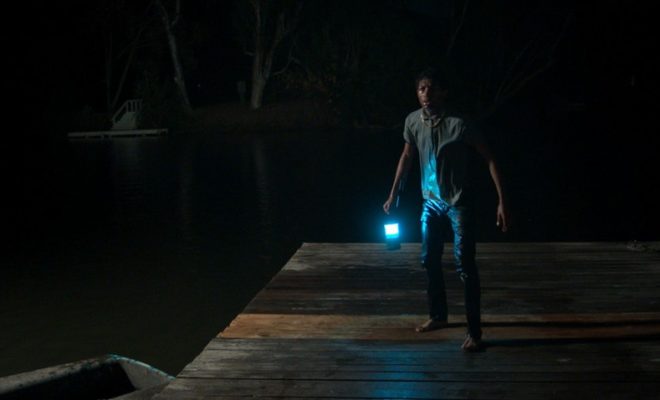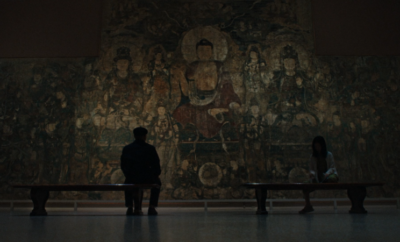
Interviews
Delmar Washington & Tucker Morgan – No Running
By: MJ Asuncion
Q) The movie gives such a unique viewpoint on racial injustice and prejudice, mixed in with the mystery behind UFO abductions. Where did the inspiration behind the story come from?
Tucker Morgan: I based a lot of the story on my own experiences. I was adopted and grew up in a very white community, a very white state. Initially, when I was creating this concept, I found myself asking questions about situations that I’ve been in, in the past. For example, in this story, if I had been at a party and I left the party with a girl, and the girl went missing, what would happen to me? And I’m also a sci-fi nerd, so at the time I was reading a New York Times article about what percentage the US believes there’s aliens, and it was really high. That sort of turned into this story. After watching the film Get Out, I felt that I could inject a sci-fi thriller with a social commentary and underlying messages in a similar way, that would make this type of story more accessible to all audiences.
Q) What made you choose to take on this movie as your first feature film directorial debut?
Delmar Washington: The reason why I chose this film…Just to give you a little bit of backstory, my journey began where I was coming out of a film festival with another short sci-fi film, and the producers of this movie saw my short film and they reached out, and said, “Hey, we got several projects that we would love for you to read to consider coming onboard to direct.” And when I read all these scripts, I came across Tucker’s film No Running and immediately I was attached to it. I felt like this was a personal story on so many different layers. One which is that I am a father of a 16-year-old boy, and the lead character in the film is that age. Every day I have concern for my son when he walks out of his door, and I pray for him, and I hope that he comes back in one piece and without any issues. And you see that in the character of Jaylen, so that was one of the personal attachments. And when I was reading Tucker’s script, I thought that he did a great job intertwining fact and fiction along with the mystery. You see this kid trying to claw his way to prove his innocence within twenty-four hours or potentially he could spend the rest of his life in jail. I just felt like there was a lot of truth to this story. I feel a lot of young black men in today’s society, people look at them as “the skin is the crime” and they don’t get the opportunity to really prove their innocence.
Q) The location of the film is a small town and they were one of the few black families living there. If it was set in a different location, like an urban city, do you feel the story’s pace would be completely different or the same? Or how do you think it would affect it?
Delmar Washington: At its core the story would be the same. Tucker has a lot of personal experiences that he can talk about that brought to the film, but for me, at its core if you look at it here is a kid who is talking about creatures. And, correct me if I’m wrong, but I don’t care who the person is – your father, your mother, your sister, your best friend – if they come talking about creatures in a conversation, you’re going to look at them as weird. And when you hear Jaylen, the lead character, talking about creatures, the town and everyone [would think], “Dude, you’re crazy. This is bizarre.” And I feel that it is symbolic to what a lot of young black kids are going through today when they are talking about the incidents that they are dealing with, [like] the police or anything of that nature, trying to clear their name, that their statements are looked at as being bizarre and they are not taken seriously. I think that the underlining backbone of the story will still continue to remain the same no matter where we would have shot it.
Tucker Morgan: I would concur. The story is universal. It is a black experience so no matter where we set it in America, a similar situation would happen in that scenario. All of these things are still happening today. We are just shining light on systemic racism. So, yeah, I think it’s universal. I don’t think it would matter if it was urban or in the country.
Q) I thought the casting was phenomenal, a lot of great actors. I was blown away by their portrayal of the characters. Were the characters’ mannerisms and personalities what you envisioned them to be or were there some adaptations made for the film?
Tucker Morgan: They brought the story to life. Even the first table read when I first met Skylan Brooks, I was like, “This is Jaylen Brown in the flesh.” I was with all the casting choices. The cast were amazing. It was just a blessing. It was just crazy to see the story come to life. Delmar and the cast did an amazing job doing that.
Q) What was the most challenging scene for you to shoot, and why?
Delmar Washington: Yeah, well, (laughs) shooting an independent film is a big challenge in itself. We didn’t have a lot of days to make this film. We shot probably about fifteen and a half, sixteen days overall, so it was a big challenge and dealing with the whole pandemic and things of that nature. But one of the most challenging scenes for me is, when you are watching the film, you see a scene when Jaylen is being interrogated by this police officer, and he’s trying to prove his point. And the police officer says, “Look at what you’re making me do.” He’s putting the blame back on Jaylen and, who in my mind, is the victim. And I feel like there is a lot of victim blaming that goes on in our society. That was kind of one of the toughest scenes to shoot because I felt the weight of so many public cases – George Floyd, Trayvon Martin, Tamir Rice – the list goes on and on. It’s like, “What were they doing to cause them to die.”
Q) There is a conflicted relationship between the Sheriff and his father. I think a lot of times he’s using that as his driving force to pin this crime on Jaylen. We never really got the real reason behind their tense relationship. Is that up to viewer interpretation or was that explained, and we just didn’t see it in the film?
Tucker Morgan: I think it is speaking to generational racism, and how racism is learned and how it is passed down. So, just superficially, that relationship was meant to explore that dynamic and how Sheriff O’Hare is living in his father’s shadow. When he’s in that room with Jaylen he has his knee on Jaylen’s neck and right there, that moment, that confliction comes out – that generational racism that’s in the back of his mind, “What do I do in this situation?” I think that is what we were trying to explore with the father and son.
Q) Which of the supporting characters was the most interesting for you to develop?
Delmar Washington: I loved working with all the cast. They were all solid across the board, and they all humbled themselves to work with me. I am the “first time feature film director” and all of my cast, they all had pretty well-known credits. The fact that I was able to work with such caliber people, it was truly a blessing.
Tucker Morgan: I would say something similar. It was really inspiring to see each cast member bring their character to life and make it their own, with their little peculiarities and nuances. It was just really surreal to watch everything come together.
Q) There was a UFO aspect to the film and that will additionally draw another type of audience. What did you think about the reason behind the UFO abductions when you first read the story?
Delmar Washington: I always felt like it was symbolic to what is going on. You see this kid who goes to a party with his girlfriend and she gets abducted by these outerly forces. And immediately because he was the last one with her, the town kind of points the finger because he’s an outsider. He doesn’t have any resources, so it is easy to do that. They look at him as “the skin is the crime.” That whole abduction for me is symbolic because as he is trying to explain his story people are like, “What are you talking about?” As I mentioned before, it comes across as being bizarre. And something as bizarre as a UFO, I feel that when people are telling their real stories, it almost feels the same to some individuals.
Q) What do you hope viewers will take away from watching this film? I know you said a lot already, but if you had to say one more thing for viewers to hopefully take away after seeing No Running?
Tucker Morgan: I hope it continues the conversation surrounding a lot of these issues. But I also hope that people are inspired, especially young black film makers, writers, directors, actors, actresses, people of color to jump in the ring again in this industry and start making new films and joining this movement. So, yeah, I hope they’re inspired but also I hope this conversation keeps growing.
Delmar Washington: Absolutely. I would piggyback on that as well. As Tucker said, continue the conversation. And I hope that people could get a real experience and a glimpse of what young black men are going through in today’s society. Again, if you look at it from the creature perspective, who’s going to save us? I feel like sometimes, African Americans, we go through things where we need an outerly force to help us. For me, it’s prayer, it’s God. In the movie, it’s the creatures. You question yourself, are these creatures real? Are they harming people? Are they helping people? At the end of the day, I always question, well who’s going to save us?




You must be logged in to post a comment Login